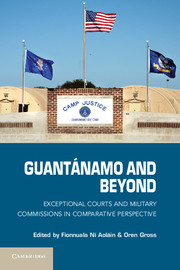Book contents
- Frontmatter
- Contents
- Contributors
- Acknowledgments
- Introduction: Guantánamo and Beyond
- Part I Military Commissions and Exceptional Courts in the United States
- Part II Exceptional Courts and Military Commissions Elsewhere
- Part III International Law, Exceptional Courts, and Military Commissions
- 14 The Right to a Fair Trial in an Extraordinary Court
- 15 Approaches and Responses of the UN Human Rights Mechanisms to Exceptional Courts and Military Commissions
- 16 Exceptional Courts and the European Convention on Human Rights
- 17 The Legitimacy Deficit of Exceptional International Criminal Jurisdiction
- Index
15 - Approaches and Responses of the UN Human Rights Mechanisms to Exceptional Courts and Military Commissions
Published online by Cambridge University Press: 05 June 2014
- Frontmatter
- Contents
- Contributors
- Acknowledgments
- Introduction: Guantánamo and Beyond
- Part I Military Commissions and Exceptional Courts in the United States
- Part II Exceptional Courts and Military Commissions Elsewhere
- Part III International Law, Exceptional Courts, and Military Commissions
- 14 The Right to a Fair Trial in an Extraordinary Court
- 15 Approaches and Responses of the UN Human Rights Mechanisms to Exceptional Courts and Military Commissions
- 16 Exceptional Courts and the European Convention on Human Rights
- 17 The Legitimacy Deficit of Exceptional International Criminal Jurisdiction
- Index
Summary
THE CHALLENGES POSED BY THE USE OF EXCEPTIONAL COURTS and military commissions have been considered, in various contexts, by many of the human rights mechanisms of the United Nations (UN). As stated by Gross and Ní Aoláin in their introduction to this collection, the use of exceptional courts as a means of responding to violent challengers is not a new phenomenon. This is borne out by the long record of action taken by UN human rights mechanisms on the subject, dating back to well before the military commissions scheme established by former U.S. President George W. Bush. This chapter provides an overview of the approaches of and responses to the use of such courts and commissions as they relate to international human rights law. Consideration is given to the views and findings of a range of UN human rights mechanisms, clustered on a thematic basis to reflect on issues of competence and jurisdiction, independence and impartiality, equality of arms, and procedural and evidentiary issues. The conclusions and recommendations considered relate to universal fair trial obligations and standards, as well as their application to country-specific contexts from throughout the world, including Algeria, Bahrain, Brazil, Cameroon, Chile, Colombia, Equatorial Guinea, Ethiopia, Guatemala, Ireland, Israel, Lebanon, Mexico, Peru, Slovakia, Turkey, and the United States of America.
Pertaining to the UN human rights treaty bodies, reference is made to General Comments, Concluding Observations on State party periodic reports, and Views on individual communications, as adopted by the Human Rights Committee (HRC), the Committee against Torture, and the Committee on the Rights of the Child. The approaches of independent human rights experts of the Human Rights Council, known as Special Procedures, are examined, including those of the Special Rapporteur on human rights and counterterrorism; the independence of judges and lawyers; torture, extrajudicial, summary and arbitrary executions; and the Working Group on arbitrary detention. Reference to the work and resolutions of political offices and bodies is also made, namely the UN Human Rights Council and its predecessor the Commission on Human Rights, and of the High Commissioner for Human Rights.
- Type
- Chapter
- Information
- Guantánamo and BeyondExceptional Courts and Military Commissions in Comparative Perspective, pp. 321 - 340Publisher: Cambridge University PressPrint publication year: 2013
- 1
- Cited by



